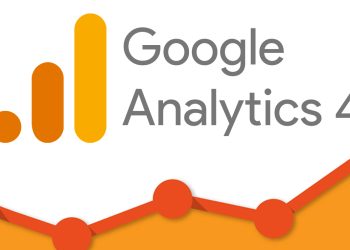Keyword analysis has shifted from being a mechanical SEO step to becoming the backbone of digital strategy. Businesses no longer compete on volume alone; they compete on how effectively they can align content with search intent.
For entrepreneurs and owners, this means that the quality of keyword insights can determine the ROI of every article, campaign, or landing page published.
The challenge is that not all keyword tools are created equal. Some will overwhelm you with data but lack practical usability, while others are streamlined but miss deeper layers of analysis. Finding the right balance is essential.
Before diving into reviews, it helps to define what actually makes a keyword tool valuable. Because once you know the benchmarks, choosing the right platform becomes much easier.
What Makes a Good Keyword Analysis Tool?
A solid keyword tool is about transforming raw data into strategic decisions. The best platforms help uncover opportunities, validate ideas, and fine-tune campaigns with precision.
When evaluating options, focus on these elements:
- Accuracy of Search Volume and Difficulty: Reliable numbers prevent wasted effort on inflated or misleading keywords.
- SERP Insights and Intent Mapping: Tools should show not just what’s searched, but why it’s searched, and what type of content ranks.
- Competitive Intelligence: Identifying the exact keywords competitors rank for offers shortcuts to viable strategies.
- Integration and Workflow Support: Smooth connections with content platforms, analytics, or CRMs streamline execution.
- Pricing Flexibility: Plans should scale with your growth, not lock you into enterprise costs too early.
Ultimately, a good keyword analysis tool sharpens strategy while staying practical for your resources.
Top Keyword Analysis Tools Reviewed
There’s no shortage of keyword analysis platforms, but not all of them will match your business needs. Some tools lean heavily toward enterprise SEO teams, while others serve freelancers or small-scale bloggers.
The real question isn’t “which tool is best overall” but “which tool fits my workflow, budget, and growth stage.”
Below, we’ll walk through six of the leading options. Each review covers an overview, standout features, pricing, and a quick pros-and-cons breakdown.
SEMrush
SEMrush is often seen as the gold standard of SEO suites, offering one of the largest keyword databases available. Its keyword magic tool digs deep into long-tail variations, while position tracking monitors ranking shifts in real time.
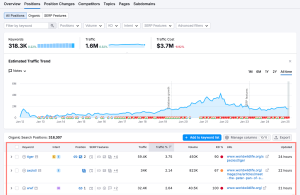
Pricing starts at $117.33 per month, which can feel steep but is justified by the breadth of features. There are some add-ons as well. For agencies, the all-in-one nature (covering content audits, keyword clustering, and competitor intelligence) makes SEMrush difficult to ignore.
Pros & Cons
| Pros | Cons |
| Extensive keyword database | High pricing for smaller businesses |
| Advanced tracking and clustering | Interface can overwhelm beginners |
| Strong competitor benchmarking | Some features are locked to higher tiers |
Ahrefs
Ahrefs built its reputation on backlinks, but its keyword research functionality is equally impressive. The platform’s Keywords Explorer tool uses clickstream data to estimate search volume more accurately, giving it an edge over many competitors.
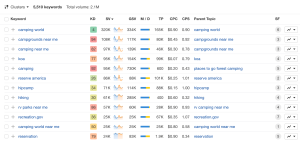
With plans beginning at $29 per month, Ahrefs remains a premium option but delivers strong ROI through its SERP analysis and keyword difficulty scoring.
Its keyword database spans multiple search engines, making it more flexible for businesses targeting audiences outside Google.
Pros & Cons
| Pros | Cons |
| Accurate volume estimates | Pricing remains on the higher side |
| Multi-engine keyword data | Limited free trial options |
| Rich SERP analysis | Learning curve for new users |
Google Keyword Planner
As a free tool, Google Keyword Planner offers the most direct line into Google’s own data. While its primary design serves advertisers, it remains valuable for initial keyword discovery and traffic forecasting.
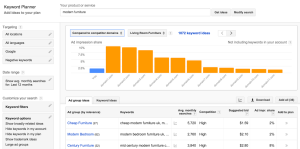
The catch is that its granularity is limited. Without pairing it with another tool, you won’t get difficulty scores, competitor comparisons, or SERP breakdowns. Still, for solo entrepreneurs on a budget, it’s a solid entry point.
Pros & Cons
| Pros | Cons |
| Free and reliable data | Lack of detailed metrics |
| Integration with Google Ads | Limited use for organic SEO |
| Strong for traffic forecasting | Requires supplementary tools |
Moz Keyword Explorer
Moz has been around long enough to refine its keyword explorer into a trusted research tool. It stands out with its proprietary difficulty and priority scores, which help filter keywords based on both effort and potential reward.
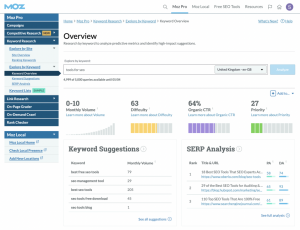
Pricing starts at $49 per month with access to the broader Moz Pro suite. While not as data-heavy as Ahrefs or SEMrush, its intuitive interface and well-calibrated metrics make it attractive to marketers who value simplicity with depth.
Pros & Cons
| Pros | Cons |
| Easy-to-digest scoring system | Smaller keyword database than competitors |
| Clean and intuitive interface | Limited integrations |
| Balanced insights for strategy | Advanced features require the full suite |
Ubersuggest
Ubersuggest has positioned itself as a budget-friendly option, offering strong keyword insights at a fraction of the cost of premium tools. Its reports include search volume, competition levels, and seasonal trends, making it useful for content planning.
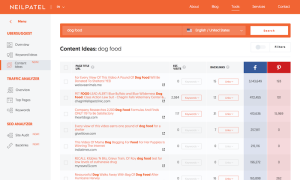
Plans begin at $12 per month, with lifetime deals often available. While it lacks the robustness of SEMrush or Ahrefs, it’s more than adequate for freelancers, bloggers, or smaller businesses testing the waters of SEO.
Pros & Cons
| Pros | Cons |
| Affordable pricing | Limited depth compared to premium tools |
| User-friendly interface | Some data is less accurate |
| Good for long-tail keywords | Features overlap without advanced detail |
Serpstat
Serpstat combines keyword analysis with site audit and backlink tracking, making it an affordable all-rounder. Its keyword clustering and tree-view analysis stand out for businesses managing multiple content pillars.
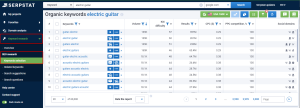
Pricing starts at $50 per month, positioning it as mid-tier. It’s not as polished as SEMrush or Ahrefs, but it offers a surprising amount of functionality for the price. Agencies and teams scaling up often find Serpstat appealing.
Pros & Cons
| Pros | Cons |
| Strong keyword clustering | The interface can feel clunky |
| Affordable mid-range option | The database is smaller than the top competitors ‘ |
| Includes multi-function SEO tools | Occasional speed issues |
Comparative Insights: Which Tool Fits Whom?
The right keyword analysis tool depends less on brand reputation and more on your stage of growth. An agency juggling dozens of clients will naturally gravitate toward full-suite platforms like SEMrush or Ahrefs, where breadth and accuracy outweigh cost.
For solo entrepreneurs or small business owners, affordability and ease of use carry more weight. Ubersuggest or Google Keyword Planner makes sense here, giving you solid data without financial strain.
They may lack advanced clustering or competitor tracking, but they deliver enough insight to guide content direction.
Marketers in highly competitive niches, however, benefit from tools like SpyFu or Serpstat. These platforms uncover competitor strategies and provide tactical opportunities for targeting.
In short, match the tool to your current priorities (scalability, affordability, or competitor intelligence) rather than chasing the platform with the longest feature list.
Conclusion
Keyword analysis tools aren’t interchangeable; each offers a unique angle on how to approach SEO. Some provide raw power, others accessibility, and a few balance both. The best choice is the one that aligns with your workflow, budget, and long-term strategy.
Experiment with free trials, benchmark results against your goals, and refine from there. Ultimately, tools are only as strong as the strategy behind them, and success comes from combining accurate data with consistent execution.




